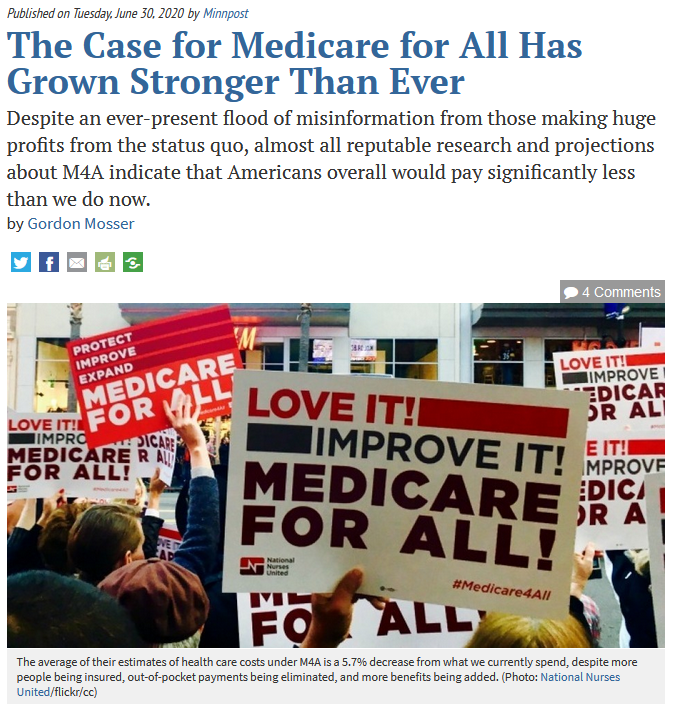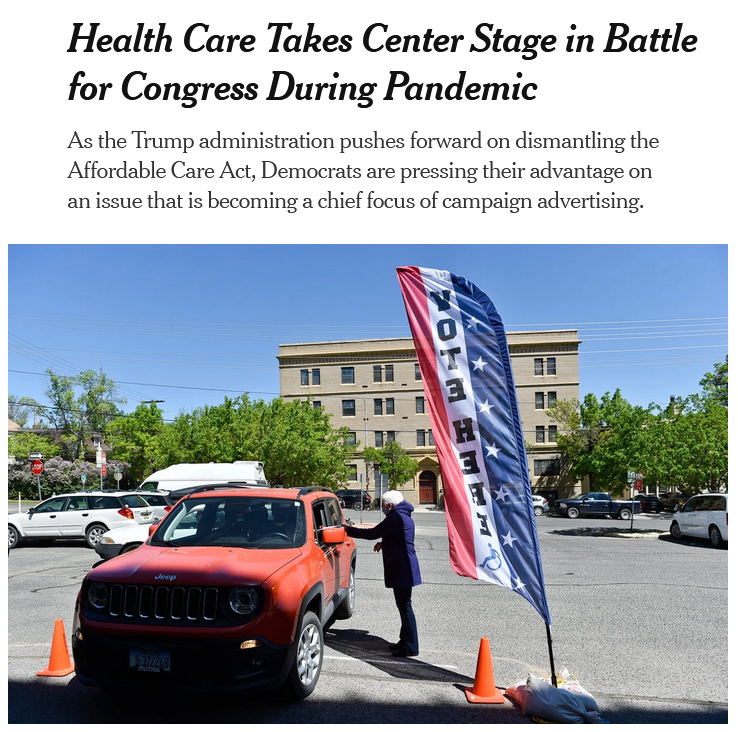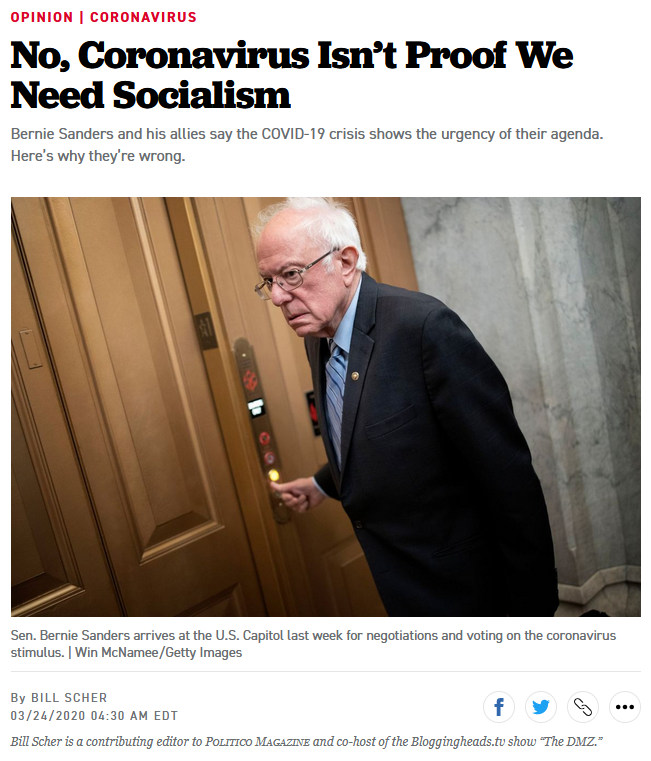‘If We Had Single-Payer Healthcare, People Would Get the Care They Need’
JANINE JACKSON

Janine Jackson interviewed the University of Minnesota’s Dr. Gordon Mosser about Covid and Medicare for All for the July 10, 2020, episode of CounterSpin. This is a lightly edited transcript.
But when I looked at major news outlets recently for stories including the terms “Coronavirus” or “Covid” and “Medicare for All, “ I found only reports on Medicare for All as an issue. Some Sanders voters say they can wait four more years for Medicare for All. Support for Medicare for All is part of some insurgent Democrats’ “unabashedly left-wing platform.” The New York Times called support a litmus test for progressives, lauding a Senate candidate for staying away from it, while CNN ponders whether Joe Biden “needs to appease people who want him to be in favor of Medicare for All.”
For many media, by the looks of it, healthcare for everyone is preeminently a political football—while for millions of Americans, it's a life-or-death need and a rallying cry, which the unequally shared ravages of the coronavirus pandemic only make more acute.
Gordon Mosser is an MD and a senior fellow in the Division of Health Policy and Management at the University of Minnesota School of Public Health. His article, “The Case for Medicare for All Has Grown Stronger Than Ever ,” appeared recently on MinnPost.com, as well as Common Dreams. He joins us now by phone. Welcome to CounterSpin, Gordon Mosser.
Gordon Mosser: Thank you very much for having me here.
JJ: Early on in the pandemic, we saw some articles like “No, Coronavirus Isn't Proof We Need Socialism,” that cautioned against talking about Medicare for All in the context of Covid, suggesting that it was opportunistic or ideological to do so. Of course, maintenance of the status quo is ideological. But also, it's just strange to say that a public health crisis isn't the time to talk about how we as a society do healthcare. In what particular ways does what we're seeing strengthen an argument for Medicare for All?
GM: In the first place, it makes it vividly clear that many people cannot afford healthcare, including people who normally would have been in good health and not needed it, but now with a pandemic on, we've got a lot of people who unexpectedly need healthcare. And as you said in your setup piece, the prices charged are all over the place; some of them are utterly outrageous, and if we had single-payer healthcare, or universal healthcare, we wouldn't have this problem; people would be able to get the care they need.
Secondly, without healthcare available at no cost to everyone, there are many people who hold off getting even tested, let alone treated. And this causes problems for the population as a whole, because those folks who actually have the disease, but don't even know about it, are spreading it without realizing that they're doing it.
And the third problem is that, it doesn't create inequities in healthcare, but it makes them starkly vivid. In television coverage recently, not right now, but in March, there was footage of hospitals in Brooklyn and Queens that showed obviously shabby circumstances and inadequate staffing. And then there was footage shown from upscale hospitals in Manhattan, where everything was just fine. That shouldn't be.
JJ: It seems clear it calls for a coordinated response. You can't do it piecemeal. But coordinated and systemwide, those aren't words or concepts that are generally center stage in the US. There's a kind of, “We're scrappy individualists; if you can get healthcare, then you deserve healthcare.” And the pandemic really makes clear that you're only as healthy as your sickest person. We are a society, whether some people like it or not.
GM: Yeah, the lack of a coordinated approach, both to the prevention and to the management of an epidemic when it occurs, is glaringly absent in the United States. The incompetence of our senior leadership at this point complicates the picture, because one could argue that, if they weren't so incompetent, the situation wouldn't be as bad as it is. And that's probably true. But in any case, we wouldn't have a coordinated approach, because we don't have any governmental body, or any other, that's authorized to take action to create a coordinated response.
Part of that is due to the fact that we fund public health primarily at the state and local level. About 90% of public health expenditures are made by states and local authorities; only 10% by the federal government.
So we get lots of movements here and there that don't have really anything to do with each other. Keeping things locked down, opening up quickly, all these very obvious differences reported in the news every day. If we had a single payment system, then the federal government would be paying for pretty much everything, and it would have a very strong motive to assure effective, coordinated public health activities.
Right now, failures in public health result in extra costs, primarily for private insurers. Federal government, of course, has to pay for the failures as they affect Medicare and Medicaid, but not as they affect the rest of the population, which is more people. If we had a single system, we would have good motive for the federal government to pay more attention and fund public health better than they do at present.
JJ: It almost seems willfully ignorant at this point to keep saying about Medicare for All, “Well, how would we pay for it? How would we pay for it?” Because I do feel that many folks have put a lot of energy into answering precisely that question. But assuming an earnest concern, you recently published a review of studies on specifically the question of cost of the Medicare for All bills that are currently before Congress. That's HR.1384 and S.1129. I wonder if you could tell us, in layperson's terms, what that look at costs, and studies of costs, illustrated.

Gordon Mosser: "We keep hearing, of course, from the private insurance companies and from the pharmaceutical companies and from politicians, principally on the right, that we really can't afford Medicare for All. This is nonsense. We can afford it."
GM: In any discussion, almost, of Medicare for All, once all the benefits are made clear, somebody will say, “Yeah, OK, fine, but how much will that cost?” And the short and accurate and—for many people—surprising answer is: nothing.
How can that be? The cost for US healthcare under Medicare for All would be less than what it is currently, and how much less depends on which study you look at. But if you look at them overall, and do some critique and averaging, as I did in the paper I’ve published, the decrease in costs would be about 6% under Medicare for All. Amazing! You know, more people would be covered, more benefits would be provided. How can that be?
The answer lies principally in two arenas. First of all, the most important one is the waste of private insurance administration. Private insurance administration costs about 13.2% of the premiums they charge, a very large percentage. Medicare, in contrast, costs 2.3%. So if you can get rid of more than 10% of overall healthcare expense by shifting from the inefficient private administration model to Medicare for everybody, you can save a lot of money.
The second arena is drugs. Currently, US government is forbidden by law from negotiating with pharmaceutical companies for Medicare drug costs, the so-called Medicare Part D plan. Forbidden by law—that is utterly outrageous. And under Medicare for All, of course, this arrangement, which is purely for the benefit of the pharmaceutical companies, would be removed. The estimates for how much would be saved on pharmaceutical costs vary, but it's at least 10%; it might be 40%. So that's the second arena.
There are a few others too, but those are the principal ones. And if you look at them, sources of savings—despite more people covered, more benefits provided—you can drop the cost below what the current cost is. So we don't need to be concerned about the cost.
And we keep hearing, of course, from the private insurance companies and from the pharmaceutical companies and from politicians, principally on the right, that we really can't afford Medicare for All. This is nonsense. We can afford it. That's not the issue at all, shouldn't be an obstacle at all. You can argue about whether it's a good idea to have the federal government more heavily involved in healthcare; that's a different question. But the overall cost would be less than it is now.
JJ: And the separation of jobs and healthcare, I think, in terms of seeing what the pandemic is uncovering or revealing or illustrating, the fact that if you lose your job, through no fault of your own, you also lose your healthcare. It seems to me that is an opportunity for folks to say, “Well, why should our healthcare be connected to our jobs?” So, in other words, I guess I'm just asking, like, this is an opportunity. There’s always been an argument for Medicare for All, but my golly, if you don't see it now, I mean, this does seem to highlight the flaws that have been there.
GM: Yeah, I agree. Let's put the spotlight on the defects in our current system. We had 30 million people without health insurance prior to the pandemic. Now many people have lost their jobs. It's kind of hard to keep track, and I haven't heard or read any really reliable figures, but it's more than 30 million, that's for sure now.

Common Dreams (6/29/20)
JJ: I guess what we can do is keep the information out there in front of people—no matter what politician is saying it, or not saying it—but just keep the facts on the ground in front of people, and the idea that we do have alternatives. We don't just have to do what we've always done.
GM: Right.
JJ: All right, then. We've been speaking with Gordon Mosser; he's senior fellow in the Division of Health Policy and Management at the University of Minnesota School of Public Health. His article, “The Case for Medicare for All Has Grown Stronger Than Ever,” which includes a link to his research review, appeared recently on Minnpost.com, as well as on Common Dreams.org. Gordon Mosser, thank you so much for joining us this week on CounterSpin.
GM: Well, thank you very much.
| 






No comments:
Post a Comment
Note: Only a member of this blog may post a comment.